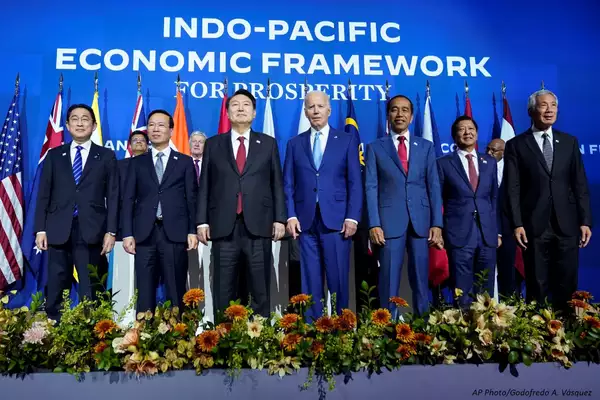India recently signed agreements related to the Indo-Pacific Economic Framework for Prosperity (IPEF) during Prime Minister’s visit to the United States. This move aims to enhance economic cooperation and address environmental challenges among member nations.
About the IPEF:
- Objective: Strengthen economic engagement and cooperation to foster growth, stability, and prosperity in the Indo-Pacific region.
- Member Countries: 14 members including Australia, India, Japan, and the USA.
Key Agreements Signed:
- Clean Economy Agreement (Pillar III)
- Focus: Development and deployment of clean energy technologies.
- Goals:
- Enhance energy security and climate resilience.
- Mitigate greenhouse gas emissions among member countries.
- Initiatives: IPEF Catalytic Capital Fund aimed at mobilizing $3.3 billion in private investments.
- Fair Economy Agreement (Pillar IV)
- Focus: Promote a transparent and predictable business environment.
- Goals:
- Combat corruption and improve tax transparency.
- Facilitate information sharing and enhance asset recovery processes.
- Overarching IPEF Agreement
- Aim: Establish a high-level political oversight framework for various IPEF agreements.
- Significance: Enhances India’s productive capacity and integration into global supply chains.
Structure of IPEF:
- Trade (Pillar I): India maintains observer status.
- Supply Chain Resilience (Pillar II): Agreement ratified by India in February 2024.
- Clean Economy (Pillar III):
- Focus: Development and deployment of clean energy technologies.
- Goals:
- Enhance energy security and climate resilience.
- Mitigate emissions among IPEF partners.
- Initiatives: Investments and capacity building for industries, especially MSMEs, through programs like the IPEF Catalytic Capital Fund and IPEF Accelerator.
- Fair Economy (Pillar IV)
- Focus: Establish a transparent and predictable trade and investment environment.
- Goals:
- Combat corruption and enhance tax transparency.
- Improve domestic resource mobilization and tax administration.
- Initiatives: Strengthen information sharing, facilitate asset recovery, and bolster cross-border investigations and prosecutions.
Importance of the Agreements
- Investment in Green Technologies: Agreements are expected to catalyze investments in green technologies, enhancing sustainable development.
- Strengthened Anti-Corruption Measures: Initiatives to improve tax administration and combat corruption will promote a fair trade environment.
- Collaborative Programs: The IPEF Accelerator and other initiatives aim to integrate Indian companies into global value chains.
Concerns and Considerations
- Transparency in Negotiations: Some experts express concerns regarding the secrecy surrounding the IPEF negotiations.
- Compliance Risks: Adoption of US and OECD standards could pose challenges for India, necessitating swift development of domestic standards to avoid disadvantages in international negotiations.
Additional IPEF Initiatives
- IPEF Upskilling Initiative: Targeted at empowering women and girls in emerging and middle-income partner countries.
- Critical Mineral Dialogue: Focuses on strengthening critical mineral supply chains and promoting sustainable mining practices.
Ref: Source
| UPSC IAS Preparation Resources | |
| Current Affairs Analysis | Topperspedia |
| GS Shots | Simply Explained |
| Daily Flash Cards | Daily Quiz |
Frequently Asked Question:
What is the main objective of the Indo-Pacific Economic Framework for Prosperity (IPEF)?
The IPEF aims to strengthen economic cooperation, foster growth, and enhance stability and prosperity in the Indo-Pacific region.
What are the key agreements signed by India under IPEF?
India signed the Clean Economy and Fair Economy agreements, focusing on clean energy technologies and improving tax transparency, respectively.
What is the Clean Economy Agreement under IPEF?
It focuses on developing and deploying clean energy technologies to enhance energy security and reduce greenhouse gas emissions among member countries.
How does the IPEF enhance India’s role in global supply chains?
The overarching IPEF agreement strengthens India’s productive capacity and integration into global supply chains through collaborative programs like the IPEF Accelerator.
What are the challenges for India regarding IPEF compliance?
Experts highlight the need for India to develop domestic standards to match US and OECD standards to avoid disadvantages in international negotiations.




